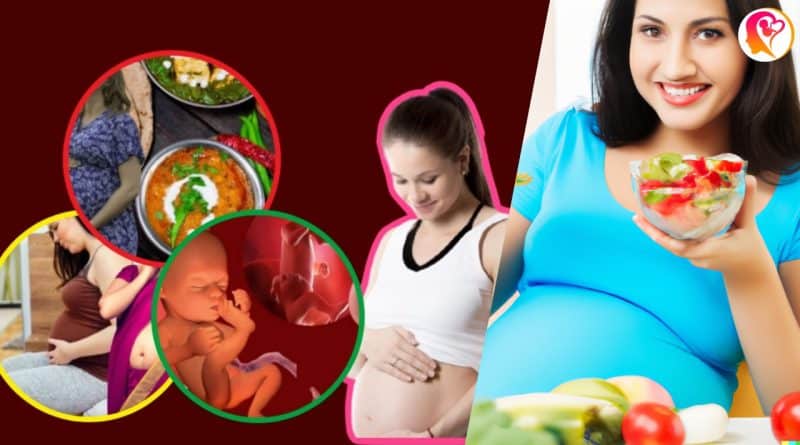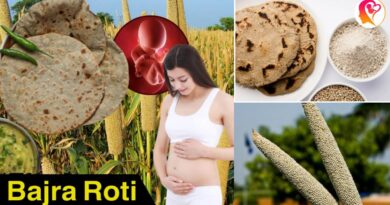Pregnancy Diet – Month By Month
इस लेख को हिंदी में पढ़िए
In this article, we will be discussing the pregnancy diet, month by month, from the first month until the ninth month. We will cover both vegetarian and non-vegetarian options. Eating fruits or drinking fruit juice is very important during pregnancy. Keep yourself hydrated, for that drink at least 8 glassful of water everyday. Now Let us understand month by month what you should eat.
Highlights of Article
First Month
During the first month of pregnancy, it’s essential to eat a well-balanced diet that includes plenty of fruits, vegetables, and whole grains. Proteins are also essential during this time to help the baby grow. If you are a non-vegetarian, you can include lean meat, fish, and eggs in your diet. For vegetarians, you can include lentils, beans, and nuts in your diet. Folic acid is an essential nutrient during the first trimester of pregnancy, and you can include folic acid-rich foods such as leafy green vegetables, fortified cereals, and beans in your diet.
Second Month
During the second month, you should continue to eat a healthy and balanced diet that includes plenty of fruits and vegetables. You should also start consuming more calcium to help with the baby’s bone growth. Non-vegetarians can consume dairy products, while vegetarians can include calcium-fortified plant-based milk, tofu, and leafy green vegetables. You can also include folic acid-rich foods in your diet during this month.
Third Month
During the third month, you should continue to focus on a well-balanced diet. You should include foods that are rich in folic acid and iron, such as leafy green vegetables, whole grains, and legumes. Folic acid is still important during this month to help with the baby’s neural tube development. Non-vegetarians can consume red meat and poultry, while vegetarians can include beans, nuts, and fortified cereals.
Fourth Month
During the fourth month, you should continue to consume a well-balanced diet that includes fruits, vegetables, and whole grains. You should also start consuming more omega-3 fatty acids to help with the baby’s brain development. Non-vegetarians can include fatty fish, while vegetarians can consume chia seeds, flaxseeds, and walnuts. You can also include foods rich in iron, such as red meat, beans, and fortified cereals.
Fifth Month
During the fifth month, you should continue to consume a well-balanced diet. You should also start consuming more vitamin D to help with the baby’s bone development. Non-vegetarians can consume fortified milk and fatty fish, while vegetarians can include vitamin D-fortified plant-based milk, tofu, and mushrooms. You can also include foods rich in omega-3 fatty acids and iron.
Sixth Month
During the sixth month, you should continue to eat a well-balanced diet that includes plenty of fruits, vegetables, and whole grains. You should also start consuming more vitamin C to help with the baby’s immune system. Non-vegetarians can include citrus fruits, while vegetarians can consume fruits such as strawberries, kiwi, oranges, pomegranates and apples. You can also include foods rich in calcium and iron.
Seventh Month
During the seventh month, you should continue to focus on a well-balanced diet. You should also start consuming more vitamin K to help with the baby’s blood clotting. Non-vegetarians can consume leafy green vegetables, while vegetarians can include spinach, kale, and broccoli. You can also include foods rich in vitamin C, calcium, and iron.
Eighth Month
During the eighth month, you should continue to consume a well-balanced diet. You should also start consuming more fiber to help with constipation. Non-vegetarians can include whole grains, while vegetarians can consume fruits, vegetables, and whole grains. You can also include foods rich in iron and vitamin K.
Ninth Month
During the ninth month, you should continue to consume a well-balanced diet. You should also start consuming more protein to help with the baby’s growth. Non-vegetarians can include lean meats and poultry, while vegetarians can consume lentils, beans, and tofu. You can also include foods rich in fiber, iron, vitamin K, and vitamin C.
What NOT to eat and Precautions
Apart from this make sure to avoid fruits like raw papaya, pineapple, black grapes, sapota during pregnancy. You may eat them as and when delivery date is approaching. Avoid eating raw meat or fish, half fried eggs or things made from unpasteurised milk . Throughout the pregnancy journey, refrain from alcohol, tobacco and smoking. Never Self Medicate for any problem you may face, be it small or big. Get in touch with your gynaecologist whenever there is any health issue.
Conclusion
In conclusion, a well-balanced and nutritious diet is essential for a healthy pregnancy. You should consume a variety of foods to get all the essential nutrients. You should also stay hydrated and avoid alcohol and caffeine. If you are a vegetarian, you can still consume all the essential nutrients through plant-based sources. It’s important to consult with your doctor or a registered dietitian to make sure that you are getting all the essential nutrients for a healthy pregnancy. Don’t forget to include folic acid-rich foods in your diet during the initial three months of pregnancy. We hope this article was informative and helpful. Thank you for reading, and don’t forget to Subscribe to garbhgyan.com for more pregnancy tips and informations.




